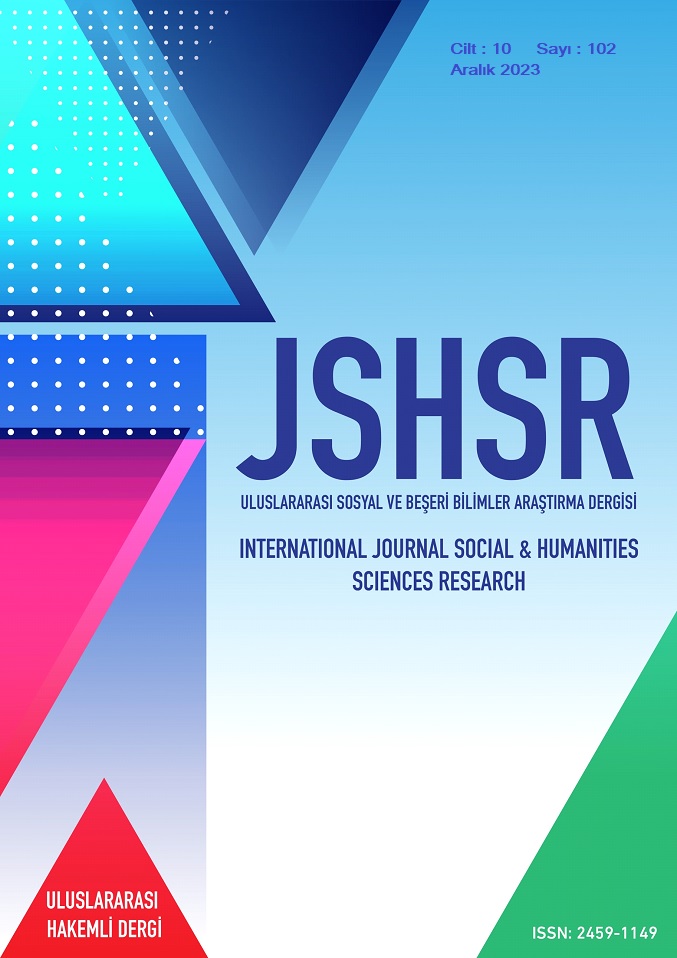A Survey on Sustainable Development Consciousness
DOI:
https://doi.org/10.5281/zenodo.10452532Keywords:
Sustainable Development, Environmental Sustainability, Sustainable Development AwarenessAbstract
Sustainable development goals (SDGs), formulated as the “2030 Agenda”, are one of the first agenda items of almost all countries. For sustainable development to be sustainable, economic, social, and environmental sustainability, which are the sub-dimensions of sustainable development, must be realized with integrity and balance. When we look at the studies in the literature, studies measuring sustainable development awareness are evaluated in parts rather than measuring awareness about sub-dimensions holistically. On the other hand, these studies have determined that individuals do not associate their sustainable development awareness with their knowledge, attitude, and behavior levels. Therefore, the motivation of this study is to fill this gap in the literature.
For this purpose, the study aims to relate individuals' sustainable development awareness to their knowledge, attitude, and behavior levels. The scale used in the study was developed by Gericke et al. (2019). The data was collected and analyzed online via “Google Forms” on social media, using the convenience sampling method. According to the results of the analysis, it has been observed that while sustainable development awareness varies according to gender, age, profession, income level and whether the person has heard of the concept of sustainable development before, it does not differ according to educational status, where the person grew up, marital status and the school status the person is currently studying.
References
Anand, S., & Sen, A. (2000). Human development and economic sustainability. World Development, 28(12), 2029–2049. http://citeseerx.ist.psu.edu/viewdoc/download?doi=10.1.1.699.3587&rep=rep1&type=pdf.
Atkinson, G., Dietz, S., & Neumayer, E. (2007). Introduction. In G. Atkinson, S. Dietz, & E. Neumayer (Eds.), Handbook of Sustainable Development (pp. 1–23). Cheltenham, UK: Edward Elgar Publishing.
Aydın, A. H. ve Çamur, Ö. (2017). Avrupa Birliği Çevre Politikaları ve Çevre Eylem Programları Üzerine Bir İnceleme, Bingöl Üniversitesi Sosyal Bilimler Enstitüsü Dergisi, Cilt 7, Sayı 13, s.21-44.
Bruvoll, A. and Medin, H. (2003). Factors behind the Environmental Kuznets Curve a Decomposition of the Changes in Air Pollution, Environmental and Resource Economics, 24: 27–48.
Cambridge Dictionary. Consciousness https://dictionary.cambridge.org/dictionary/english/consciousness
Cato, M.P., & Varro, M.T (1954). Marcus Porcius Cato on agriculture; Marcus Terentius Varro on agriculture. English translation by William Davis Hooper. Revisededition, second printing. Cambridge, MA: Harvard University Press.
Columella, L.J.M..(1948). Resrustica. Lucius Julius Moderatus Columella on agriculture, vol.1 (BooksI–IV). English translation by Harrison Boyd Ash. Cambridge, MA: Harvard University Press.
Costanza, R., Patten, B. C. (1995). Defining and predicting sustainability, Ecological Economics, 15 (3), pp:193-196. DOI: 10.1016/0921-8009(95)00048-8.
Çorbacı, O. K. (2023). DKAB Öğretim Programı Ekseninde Çevre Bilinci, Pamukkale Üniversitesi İlahiyat Fakültesi Dergisi, 10 (1), 168-191.
Demirtaş, Ç. Ö. (2015). Öğretmen Adaylarının Sürdürülebilir Kalkınma Farkındalık Düzeyleri, Marmara Coğrafya Dergisi, 31, s.300-316.
Du Pisani, J. A. (2006). Sustainable Development – Historical Roots of the Concept. Environmental Sciences 3 (2), 83-96.
Duru, B. (2007). Avrupa Birliği Çevre Politikası. (Ed., Erhan, Çağrı ve Senemoğlu, Deniz). İmaj Yayınevi: Ankara. s. 280.
Gericke, N., Boeve‐de Pauw, J., Berglund, T., & Olsson, D. (2019). The Sustainability Consciousness Questionnaire: The theoretical development and empirical validation of an evaluation instrument for stakeholders working with sustainable development, Sustainable Development. 27:35–49. DOI:10.1002/sd.1859
Görmez, K. (2010), Çevre Sorunları, Nobel Kitabevi, Basım sayısı:3, Sayfa sayısı:175. ISBN6053200949
Hair, J., Black, W.C., Babin, B. J. ve Anderson, R.E. (2010). Multivariate Data Analysis (7th Edition). NJ: Prentice-Hall Publication
Markulev, A., & Long, A. (2013). On sustainability: An economic approach (Staff Research Note). Canberra: Productivity Commission. https://www.pc.gov.au/research/supporting/sustainability.
McKeown, R., Hopkins, C., Rizzi, R. ve Chrystalbride, M. (2002). Education for Sustainable Development Toolkit. Knoxville: Energy, Environment and Resources Center, University of Tennessee., 1-142.
Nilsson, M., Griggs, D., Visbeck, M., (2016). Policy: map the interactions between Sustainable Development Goals. Nature, 534(7607),320–322. 534, 320-322. https://doi.org/10.1038/534320a
Paul, B. D. (2008). A history of the concept of sustainable development: Literature review. The Annals of the University of Oradea, 17(2): 577-579.
Rojas-Fernández A.G., Aguilar-Santelises L., Millán M.C., Aguilar-Santelises M., García-Del Valle A., (2017). Teaching Chemistry with sustainability, multidisciplinary journal for education, Social And Technological Sciences, 4(1): 102-121.
Shrivastava, P. (1995). The Role of Corporations in Achieving Ecological Sustainability, Academy of Management Review, 20 (4). DOI: 10.5465/amr.1995.9512280026
Sikdar, S.K. (2003). Sustainable Development and Sustainability Metrics, AIChE Journal, 49 (8).
Strabon (1949). The geography, vol. II, Book V. English translation by Horace Leonard Jones. London: Heinemann.
Summers, M., & Childs, A. (2007). Student science teachers' conceptions of sustainable development: An empirical study of three postgraduate training cohorts. Research in Science and Technological Education, 25(3), 307–327.
Swaney, J. A. (1987). Elements of a Neoinstitutional Environmental Economics, Journal of Economic Issues, 21 (4).
Tang, T., Fang, E., ve Wang, F. (2014). Is neutral really neutral? the effects of neutral user-generated content on product sales. Journal of Marketing, 78(4): 41–58.
UN (2022). The Sustainable Development Goals Report 2022.. https://unstats.un.org/sdgs/report/2022/
UNEP (2015). Integration and coherence key to the post‐2015 sustainable development agenda. http://www. unep.org/roap/Portals/96/UNEP‐Post‐2015‐Note‐8.pdf.
Van Zon, H. (2002). Geschiedenis En Duurzame Ontwikkeling. Duurzame Ontwikkeling In Historisch Perspectief: Enkele Verkenningen. Nijmegen/Groningen: Werkgroep Disciplinaire Verdieping Duurzame Ontwikkeling
Velmans, M. (2009). Understanding Consciousness. London, UK: Routledge
WCED (1987). Our Common Future. The United Nations World Commission on Environment and Development. Oxford, UK: Oxford University Press.
Downloads
Published
How to Cite
Issue
Section
License
Copyright (c) 2023 INTERNATIONAL JOURNAL OF SOCIAL HUMANITIES SCIENCES RESEARCH

This work is licensed under a Creative Commons Attribution 4.0 International License.


